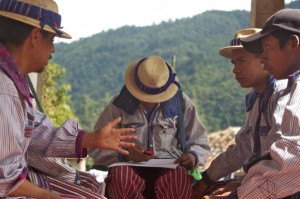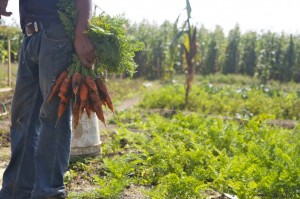I recently returned from an incredible journey to Guatemala with my coworker Clemente to visit co-ops and farmers, conducting group discussions and diagnostic surveys as part of a data gathering process for future development projects in the region, especially as they relate to food security, productivity, and economic development in for smallholder coffee farmers.
 Clemente and I were well taken care of by the co-ops we visited–they shuttled us around on Guatemala’s bumpy, unpaved roads to visit their members on the small parcels of land where they grow their coffee. Staring out of the window while seated in the front of various pickups, I wondered at the houses I saw tucked away on the side of the misty Cuchumatan mountains–who lives up there, how did they get there, what are their stories?
Clemente and I were well taken care of by the co-ops we visited–they shuttled us around on Guatemala’s bumpy, unpaved roads to visit their members on the small parcels of land where they grow their coffee. Staring out of the window while seated in the front of various pickups, I wondered at the houses I saw tucked away on the side of the misty Cuchumatan mountains–who lives up there, how did they get there, what are their stories?
On our fourth day of visiting co-ops I had my questions answered. ACODIHUE, a secondary cooperative based in Huehuetenango, brought Clemente and I to one of those houses, perched on a sheer mountainside outside of the village of Todos Santos. It was the headquarters of ADINUT Cooperative, a sub-co-op of ACODIHUE. There, we had a discussion with the member farmers, all of whom dressed in traditional clothing and spoke Mam as their first language.
The issues of food security in this area were some of the most pressing I saw on the whole trip. Each farmer owns a tiny plot of conventional coffee; when we did the math, their incomes barely covered their costs. Clemente and I conducted individual farmers surveys on the iPad, and each was listing 4-6 months of meses flacos (or “meses jodidos” as many were calling it in Guatemala) per year. During a discussion of diet and nutrition, one socio joked “Milk? The last time we had milk was from our mother!” Everybody giggled, but the message was serious; food security remains an important area of focus for these communities.
It began to rain just after the group discussion and surveys. Cruz, the leader of the co-op, lead Clemente and I around the back of the house. Turning the corner, we came across the co-op’s own fully-functioning mushroom hut. ACODIHUE was the co-op who sent Irene Maldonado to Selva Negra to teach mushroom cultivation at the Food Security Solutions Forum hosted by Sustainable Harvest in partnership with Green Mountain Coffee in June 2010–It was incredible to realize that the project was not just being talked about, but actually implemented, here in such a rural, hard-to-reach place. Moreover, seeing the project right after the discussion on food security that we had with the members of ADINUT underlined for me the urgency of the types of projects that we highlighted in the Forum.

As we continued our trip, more ripples from Food Security Solutions kept hitting us. When we visited FECCEG, an umbrella co-op based in Quetzaltenango who sent 5 reps to the Forum last June, they told us about their beekeeping project–they distribute 5 hives to each sub-coop along with training. They also have a bountiful vegetable plot right next to their dry mill, which they use as a demonstration garden for when farmers come to deliver their coffee. When we visited the garden, I again saw the benefit of Sustainable Harvest® having an agronomist on the ground: Clemente was full of info on building tomato tunnels and planting herbs among vegetables to keep away certain pests.
Seeing ADINUT’s mushroom hut and FECCEG’s vegetable garden firsthand has definitely given me a greater sense of their feasibility and scalability. Meanwhile, conducting the diagnostic surveys and meeting face-to-face with the farmers who stand to be affected by these projects underscored their importance. I’m looking forward to the ripples of another successful Forum–this year to be held in Peru–I’m happy that Sustainable Harvest is continuing to leverage its relationship with co-ops and its staff agronomists to do work in food security.



.png)
